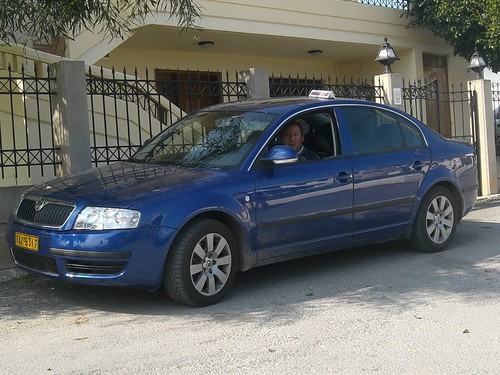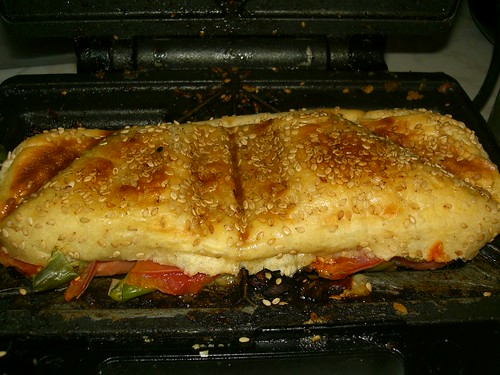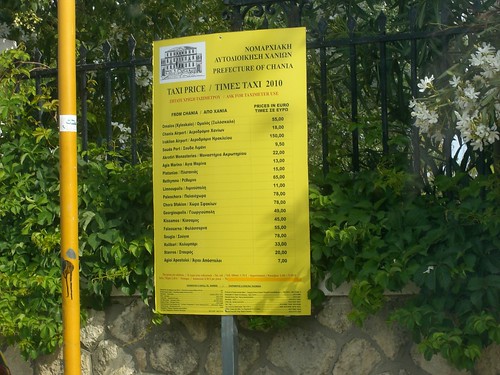My husband's line of work in the taxi business usually involves mundane rides from A to B. During the summer, foreign clients make the rides more interesting. Yesterday, he came home late, after spending 7 hours with an Indian couple holidaying in Hania. Sometimes, such exotic customers give away a lot about their culture. Yesterdy was no exception.
"The man and woman had been standing by the sign listing the indicative prices for rides at Square 1866 in Hania. I couldn't see what ride they were looking at. At one point, the man walked confidently straight up to my cab [E-class 2011 model Mercedes] and asked me outright: 'Can you take us to Elafonisi?'
"I explained that the ride was an expensive one. 'I don't care', he said. I feel obliged to explain this to foreign customers because sometimes they come here thinking that everythig in Greece is cheap, and they are shocked to hear the prices of some services. I even had someone remark 'that's London prices' and walk off in a huff. So I gathered that these people were wealthy. They looked like Indians to me. We usually think of India as a country with a lot of poor people, so this ostentatious show of wealth felt shocking to me. The taxi has been part of my family for over 50 years, but when I travel, I would never spend this kind of money on a taxi, not even with my whole family in the car. Idon't feel that rich.
"On the way to Elafonisi, I asked them where they were from (Mumbai), and why they chose Hania for a holiday (a friend of theirs had come here and given them a good review of the place). I explained a few things to them about the sites they were passing by. It's an expensive ride, and they may as well get their money's worth. They took a lot of photos, and they seemed genuinely interested in the scenery.
"On arriving to Elafonisi, I was really quite amazed to see so many people at the beach. It's mid-October, and the place looked like it hadn't calmed down since the beginning of summer. I let the passengers off and asked them what their plans were after Elafonisi. They told me they just wanted to to enhjoy the beach and they wanted me to take them back to Hania after a couple of hours. Obviously it was my lucky day today.
"The car parks in the area were full and there was no shade. Driving is the easy part of a taxi driver's journey: what tires you out is keeping the customer entertained at the same time. The weather in the northern part of Crete does not compare to the southern part. We've been feeling autumn setting in in the north, while the south still feels like high summer. While I waited for them, I could feel the car heating up. It had also become a dust bomb. Elafonisi is very dry.
"Two hours later, my customers stroll back to the cab at the designated meeting place. The man was limping a little. I asked him if he was OK. 'It's nothing,' he insisted. 'We walked the Samaria Gorge yesterday'. That made my day. they had ventured out of their comfort zone.
"'Where do you recommend we go for lunch?' the man asked. I was thinking the same thing, meaning I wanted to get back home and enjoy my own lunch. I suggested that they might like to pick a restaurant while we were driving back. The man looked around, and spotted the restaurant located on a small rise , just beyond the sandy area where the tarmac road starts. He could tell that it would have a good view of the sea. 'We'll go here!' He was always very confident about his choices.
"The waiter bought us the menu cards. I told him I was surprised to see so many people here at this time of year. 'So many?' he exclaimed. 'This is nothing! You should have seen what was happening here in the last week of September!' We've all had a good run this year in terms of tourism.
"My customers asked me to join them for lunch, whcih I think was very generous of them. This doesn't happen often. Naturally they wanted a bit of help with the menu. The restaurant served very traditional Cretan food with a few tourist dishes for those who didn't want to be too adventurous. I told them about tsigariasto - 'I don't think I want to eat goat' - pork roast - 'I don't eat pork' - braised chicken - 'Hm, chicken is common'. The woman ordered a pizza. 'What are you going to have?' the man asked me. I chose the tsigariasto. 'OK, I'll have that too,' he said. I really hoped it was going to be good.
"The meals came and we began eating. The tsigariasto was much as I expected it - slightly oily, well-cooked tender meat, falling off the bone, with a wine flavour to the sauce (no tomato). 'Does the restuarant have any hot sauces?' the man asked me. Hot food is being served more often in Cfrete these days... but this restaurant, it's location, the menu - hot food was clearly off limits. I asked the waiter, and he bought some commercial spicy tomato sauce to the table. 'Got any ketchup?' the man asked. The waiter bought some ketchup too. The man must have used up a quarter of each bottle, splurging it all over the tsigariasto. He reminded me of when my children were young and we were in London at a Pakistani restaurant. Except that they wanted to eat everything without the heat. Now they're used to other people's food, and they eat it as they find it.
"On the way back to Hania, the man asked me about other places to visit. I suggested Knossos in Iraklio. 'I mean another part of Greece'. Crete is a very big island, I explained. But they clearly wanted to go island hopping. So I mentioned the classics: Santorini, Mykonos. This is the most common route that first-time tourists take when comeing to Hania: after spending three days here, they go to Iraklio, then take the ferry from there to Santorini, with Mykonos on the itinerary too.
'You have a lot of mini markets here, don't you?' I asked him why he was asking this question. We had been driving mainly on country roads until then with hardly any shops. 'What are those people selling on the road?' he asked. What he was seeing was the local producers of natural products selling their wares along the road, and there were many of them. My customers were interested in the natural products, so he asked me to stop at the next seller. They bought wine, raki, rakomelo, thyme, oregano, marjoram, sea salt and honey, one of each item that the producer was selling on his stall. As we were leaving, the man asked me to stop again. 'Can we go back to the stall?' he asked. They decided to buy some presents too. And as we all got back into the cab again, the stall owner called me back. 'Come and take a present for yourself,' he said. I waited for him to give me the present. 'You choose,' he said. So I took a bottle of rakomelo. It was clearly his lucky day too.
We drove back to Hania with the cab smelling like a Cretan hillside from all the herbs tmy customers had bought. As I dropped my customers off at their hotel, I asked them if they enjoyed the trip. "Wonderful, wonderful! We will tell our friends to come too!' I suppose I coudn't ask for more than that."
©All Rights Reserved/Organically cooked. No part of this blog may be reproduced and/or copied by any means without prior consent from Maria Verivaki.
"The man and woman had been standing by the sign listing the indicative prices for rides at Square 1866 in Hania. I couldn't see what ride they were looking at. At one point, the man walked confidently straight up to my cab [E-class 2011 model Mercedes] and asked me outright: 'Can you take us to Elafonisi?'
"I explained that the ride was an expensive one. 'I don't care', he said. I feel obliged to explain this to foreign customers because sometimes they come here thinking that everythig in Greece is cheap, and they are shocked to hear the prices of some services. I even had someone remark 'that's London prices' and walk off in a huff. So I gathered that these people were wealthy. They looked like Indians to me. We usually think of India as a country with a lot of poor people, so this ostentatious show of wealth felt shocking to me. The taxi has been part of my family for over 50 years, but when I travel, I would never spend this kind of money on a taxi, not even with my whole family in the car. Idon't feel that rich.
"On the way to Elafonisi, I asked them where they were from (Mumbai), and why they chose Hania for a holiday (a friend of theirs had come here and given them a good review of the place). I explained a few things to them about the sites they were passing by. It's an expensive ride, and they may as well get their money's worth. They took a lot of photos, and they seemed genuinely interested in the scenery.
"On arriving to Elafonisi, I was really quite amazed to see so many people at the beach. It's mid-October, and the place looked like it hadn't calmed down since the beginning of summer. I let the passengers off and asked them what their plans were after Elafonisi. They told me they just wanted to to enhjoy the beach and they wanted me to take them back to Hania after a couple of hours. Obviously it was my lucky day today.
"The car parks in the area were full and there was no shade. Driving is the easy part of a taxi driver's journey: what tires you out is keeping the customer entertained at the same time. The weather in the northern part of Crete does not compare to the southern part. We've been feeling autumn setting in in the north, while the south still feels like high summer. While I waited for them, I could feel the car heating up. It had also become a dust bomb. Elafonisi is very dry.
"Two hours later, my customers stroll back to the cab at the designated meeting place. The man was limping a little. I asked him if he was OK. 'It's nothing,' he insisted. 'We walked the Samaria Gorge yesterday'. That made my day. they had ventured out of their comfort zone.
"'Where do you recommend we go for lunch?' the man asked. I was thinking the same thing, meaning I wanted to get back home and enjoy my own lunch. I suggested that they might like to pick a restaurant while we were driving back. The man looked around, and spotted the restaurant located on a small rise , just beyond the sandy area where the tarmac road starts. He could tell that it would have a good view of the sea. 'We'll go here!' He was always very confident about his choices.
"The waiter bought us the menu cards. I told him I was surprised to see so many people here at this time of year. 'So many?' he exclaimed. 'This is nothing! You should have seen what was happening here in the last week of September!' We've all had a good run this year in terms of tourism.
"My customers asked me to join them for lunch, whcih I think was very generous of them. This doesn't happen often. Naturally they wanted a bit of help with the menu. The restaurant served very traditional Cretan food with a few tourist dishes for those who didn't want to be too adventurous. I told them about tsigariasto - 'I don't think I want to eat goat' - pork roast - 'I don't eat pork' - braised chicken - 'Hm, chicken is common'. The woman ordered a pizza. 'What are you going to have?' the man asked me. I chose the tsigariasto. 'OK, I'll have that too,' he said. I really hoped it was going to be good.
"The meals came and we began eating. The tsigariasto was much as I expected it - slightly oily, well-cooked tender meat, falling off the bone, with a wine flavour to the sauce (no tomato). 'Does the restuarant have any hot sauces?' the man asked me. Hot food is being served more often in Cfrete these days... but this restaurant, it's location, the menu - hot food was clearly off limits. I asked the waiter, and he bought some commercial spicy tomato sauce to the table. 'Got any ketchup?' the man asked. The waiter bought some ketchup too. The man must have used up a quarter of each bottle, splurging it all over the tsigariasto. He reminded me of when my children were young and we were in London at a Pakistani restaurant. Except that they wanted to eat everything without the heat. Now they're used to other people's food, and they eat it as they find it.
"On the way back to Hania, the man asked me about other places to visit. I suggested Knossos in Iraklio. 'I mean another part of Greece'. Crete is a very big island, I explained. But they clearly wanted to go island hopping. So I mentioned the classics: Santorini, Mykonos. This is the most common route that first-time tourists take when comeing to Hania: after spending three days here, they go to Iraklio, then take the ferry from there to Santorini, with Mykonos on the itinerary too.
'You have a lot of mini markets here, don't you?' I asked him why he was asking this question. We had been driving mainly on country roads until then with hardly any shops. 'What are those people selling on the road?' he asked. What he was seeing was the local producers of natural products selling their wares along the road, and there were many of them. My customers were interested in the natural products, so he asked me to stop at the next seller. They bought wine, raki, rakomelo, thyme, oregano, marjoram, sea salt and honey, one of each item that the producer was selling on his stall. As we were leaving, the man asked me to stop again. 'Can we go back to the stall?' he asked. They decided to buy some presents too. And as we all got back into the cab again, the stall owner called me back. 'Come and take a present for yourself,' he said. I waited for him to give me the present. 'You choose,' he said. So I took a bottle of rakomelo. It was clearly his lucky day too.
We drove back to Hania with the cab smelling like a Cretan hillside from all the herbs tmy customers had bought. As I dropped my customers off at their hotel, I asked them if they enjoyed the trip. "Wonderful, wonderful! We will tell our friends to come too!' I suppose I coudn't ask for more than that."
*** *** ***
More and more people are coming to Greece for a holiday. 2017 was an interesting year for us in Hania. We've never seen so many Asian tourists coming here before. Tourism depends on stable politics in the general area which is generally an unknown quantity in our world these days. No one knows where the next attack will take place, ruining a country's reputation for safety.
The tourism season in Hania ends on 29 October 2017 and starts again on 24 March 2018. We have suffered a little from over-tourism in Crete this year. But as a Cretan I can tell you that the winter is also a wonderful time to be here too. You have the island to yourself. The weather isn't always guaranteed, but you will still be blown away by Greece's beauty, history and archaeological sites are not season-dependent, and the food is still fantastic (perhaps even better). The sea is perhaps a little over-rated anyway.
©All Rights Reserved/Organically cooked. No part of this blog may be reproduced and/or copied by any means without prior consent from Maria Verivaki.





































